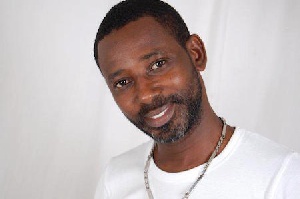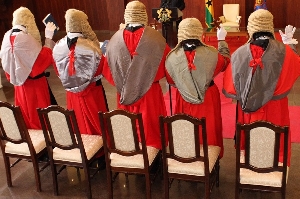After so many years in the game, Root Eye remains a formidable TV and radio presenter, and a trailblazing reggae artiste. He was there when the revolution of Ghanaian music began, and the media was slowly evolving into what it is today. Root Eye has come a long way, and is still going strong. I caught up with him to find out more.
What have you been up to lately?
Root: Well, a lot has been happening. I’m still doing ‘Music Music’ on TV3 and ‘Prime Drive’ on Prime FM. I’m in the studio recording my album which will be released before the end of the year. I’ve also been fine tuning a new concept for TV show that will begin shooting very soon. So yes, I’ve been blessed with lots of work to keep me busy.
How has the media landscape changed since you started many years ago?
Root: A lot of things have changed. It has changed from being prestigious, to being somewhat ‘yawa’. I say that without apology because that’s the fact. Back in the day, before you got on TV, you had to have been through the mill. You had to have some kind of training. You also had to literally pay your dues by being some kind of production assistant or work in a studio to learn the ropes. But now, all one needs to do is learn some DJ software, get a name like ‘DJ Sabolai’ or ‘DJ Komi K3 Kena’ or ‘DJ Bulubulu’ or whatever, the next thing you know, he’s doing his thing on radio. Media owners have lost sight of the fact that presenters have a big role to play in our social advancements. We can’t just put people on radio just because they make others laugh. There is much more to being a good presenter that just that. News on radio also used to be so credible, but now you don’t know if you have to believe it or not. There are too many jokers on radio. These days, the best radio presenter is the one who, as they say, can “fool paa”. A lot has changed.
What are some of the problems you’ve faced in your career?
Root: The biggest challenge that I’ve faced over the years is not having other people that share my vision of how radio should be packaged and should sound. Too many people believe that radio is only about entertainment. It’s not only about jokes and laughter. It’s much bigger than how they perceive it to be. It’s been a great challenge for me, but we keep surviving.
What are some of the most memorable moments of your career over the years?
Root: There have been so many. I recently met Luciano, which was very special to me, because he is one of my all-time favourite reggae artistes. Not too long ago, I got the chance to interview Gramps Morgan. Another was meeting Buju Banton. I was also one of the first Ghanaians to be featured on Mnet‘s ‘Rock Down Africa’. For close to 20 years now, every single day of my life has had a memorable moment. I step out into the street and meet people that feel blessed to meet me. It gives me that strong, uplifting vibe when you see the joy in their eyes and you can tell they enjoy your work. It’s amazing, and cannot really be described. Glory be to Jah.
Reggae/ dancehall has become really big in Ghana. How far would you say it’s come?
Root: Reggae/ dancehall has always been big in Ghana from the days of U-Roy and I-Roy, Supercat, Yellow Man, Shabba Ranks, Chaka Demus, etc. When I released my song, ‘Sweety Sweety’, people appreciated how authentic it sounded. People had tried before me, but I brought that authenticity to it. Producers Rab Bakari and Zapp Mallet got it right. Everyone that came up after that managed to make it work. All I can say it that it’s always been big. The reggae/ dancehall artistes have always been successful. For two years straight, the ‘Artiste of the Year’ award at the Ghana Music Awards have been reggae/ dancehall acts. You can say the genre is the biggest it’s ever been.
With over 40 stations in Accra alone, how do you manage to stay relevant?
Root: Honestly, I’ve never had any strategy to stay relevant. I just keep on being me. We’re all unique in our many ways. The regular Ghanaian radio listener wants to be able to relate to you. I try to cater to that listener, and it’s worked for me over the years.
If you had the chance to change something in the Ghanaian media, what would it be?
Root: It would be who qualifies to operate media house. Politicians are buying these licences just to push their agendas. It’s a blatant attempt to buy press freedom. The already polarised media will become extremely polarised. That is a recipe for chaos. Another thing I would want to see happen is some minimum level of education that should be required before one can get into the media. The media is a very fertile ground for anything, so it has to be manned by professionals. That’s what I would push for. There are quite a few broadcasters who are doing a good job, but there is still a lot of room for improvement.
What’s next for you?
Root: Well, my album is almost done. There are a lot of new TV stations coming up, so I’m trying to get myself ready as the demand for local content is increasing. It’s time to own a few shows. My crew is ready, and we will be shooting a lot of local content for all the new channels that are coming in.
A message to you fans?
Root: Well, I can only say every dream can come true. Perseverance is key. Chase your dreams and be strong in your faith, and firm in your decisions to go after your goals. Each of us is a star in the sight of Jah. We are here to leave a mark and make history, so let’s do it. May He guide us all. Give thanks. Bless.
Catch Root Eye on ‘Prime Drive’, Monday-Friday 4-6pm (Prime 89.1FM) and on ‘Music Music’, Saturdays 8:30 pm (TV3)
Entertainment of Sunday, 10 May 2015
Source: Daily Guide













